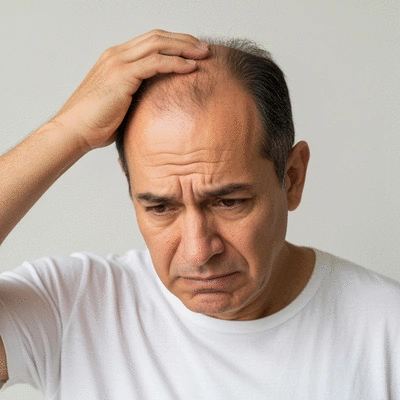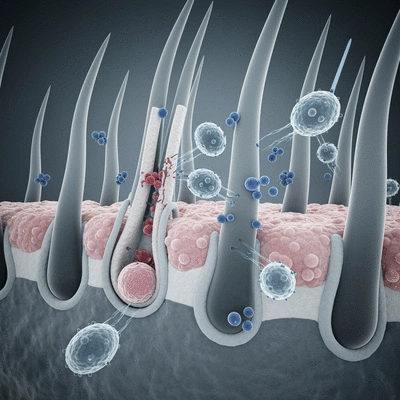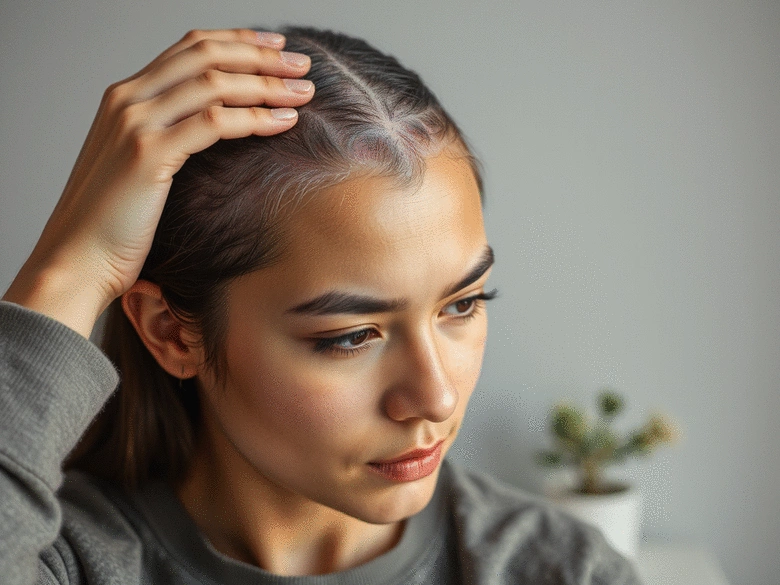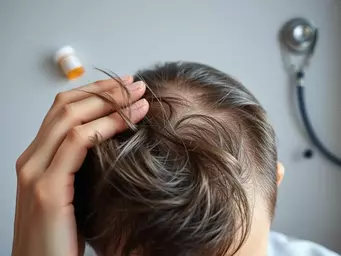Understanding Hair Loss Causes
According to recent studies, over 6.8 million people in the U.S. suffer from alopecia areata, an autoimmune disorder that can lead to significant emotional distress. Understanding this condition is crucial for those affected.
What You Will Learn
- Alopecia areata is an autoimmune disorder that causes sudden hair loss in patches.
- The immune system mistakenly attacks hair follicles, disrupting the natural hair growth cycle.
- Genetic predisposition, environmental triggers like stress, and hormonal imbalances are key factors influencing the condition.
- Emotional well-being is often affected, leading to anxiety and low self-esteem in individuals experiencing hair loss.
- Treatment options include corticosteroids and innovative therapies, with a focus on personalized care plans.
- Support groups and self-care practices are essential for managing the emotional and physical impacts of hair loss.
Understanding Alopecia Areata: Causes, Triggers, and Impact
This visual summarizes key aspects of Alopecia Areata, highlighting its autoimmune nature, common triggers, and the significant emotional toll it takes on individuals.
Defining Alopecia Areata & Its Impact
- • Autoimmune nature: Immune system attacks hair follicles.
- • Physical manifestation: Patchy hair loss, can lead to total baldness.
- • Emotional toll: Anxiety, low self-esteem due to appearance.
Causes & Triggers of Alopecia Areata
- • Genetic predisposition: Family history increases susceptibility.
- • Environmental triggers: Stress and lifestyle factors can exacerbate.
- • Hormonal influence: Imbalances can play a significant role.
Treatment & Management Steps
- • Consult a dermatologist: For personalized treatment plans.
- • Stay informed: About latest research and therapies.
- • Join support groups: Connect with others facing similar challenges.
Key Takeaways
- • Alopecia areata is an autoimmune disorder leading to hair loss.
- • Genetics, stress, and diet are significant factors.
- • Early intervention and emotional support are crucial.
Understanding Autoimmune Causes of Hair Loss
When we talk about hair loss, one of the most important conditions to consider is alopecia areata. This autoimmune disorder is characterized by sudden hair loss, often in patches, and can significantly impact those affected. It occurs when the immune system mistakenly attacks hair follicles, leading to hair thinning or complete baldness in certain areas. As someone who has seen many patients grappling with the emotional fallout of this condition, I know that understanding alopecia areata is crucial for finding the right path forward.
Individuals with alopecia areata may experience not only physical changes but also emotional distress. The lack of hair can lead to feelings of embarrassment, anxiety, or even depression. This is why it's essential to recognize its effects and explore the various factors at play. Let's dive deeper into what alopecia areata means and how it influences the lives of many.

Defining Alopecia Areata and Its Impact
Alopecia areata is more than just a cosmetic concern; it’s classified as an autoimmune disorder. In this condition, the body’s immune system turns against itself, specifically targeting hair follicles. The result? Hair can fall out in small, round patches, which can be distressing for many individuals.
- Autoimmune nature: The body’s immune response mistakenly attacks hair follicles.
- Physical manifestation: Hair loss can occur in patches, and in some cases, it can lead to total baldness.
- Emotional toll: Many individuals experience anxiety and low self-esteem due to their appearance.
Recognizing these impacts allows us to approach treatment and support strategies with empathy and understanding, which is crucial in my practice at What Causes Hair Loss.
How Autoimmune Disorders Trigger Hair Loss
The immune system plays a fascinating role in hair growth and loss. In healthy individuals, hair follicles enjoy what we call "immune privilege," meaning they are somewhat shielded from the immune system’s attack. However, in cases like alopecia areata, this privilege is compromised.
When the immune system is triggered, it can mistakenly identify hair follicles as foreign invaders. This results in inflammation and follicle damage, leading to hair loss. It's important to understand that while alopecia areata can be sudden and unpredictable, it is a manageable condition with the right approaches.
Identifying Causes and Triggers of Alopecia Areata
Understanding the causes and triggers of alopecia areata is essential for effective management. This condition often arises from a combination of genetic and environmental factors that come together in complex ways.
- Genetic predisposition: Family history can increase susceptibility.
- Environmental triggers: Factors like stress and lifestyle can exacerbate the condition.
- Hormonal influence: Imbalances can also play a significant role in hair loss.
By exploring these underlying causes, I aim to help my readers at What Causes Hair Loss better understand their hair health and the options available to them. Together, we can tackle the tricky world of alopecia areata and find the right path for recovery!
Interactive Poll
We want to hear from you! Have you or someone you know experienced alopecia areata? Share your thoughts below:
Frequently Asked Questions About Alopecia Areata
- What is alopecia areata?
- Alopecia areata is an autoimmune disorder where the immune system mistakenly attacks hair follicles, leading to sudden hair loss, often in patches.
- What are the main causes and triggers?
- Causes and triggers include genetic predisposition, environmental factors like stress and lifestyle, and hormonal imbalances.
- How does alopecia areata impact emotional well-being?
- The condition can lead to significant emotional distress, including anxiety, embarrassment, and low self-esteem due to visible hair loss.
- What are the treatment options for alopecia areata?
- Treatment options include corticosteroids, other medications, and emerging innovative therapies like JAK inhibitors. A dermatologist can help create a personalized plan.
- Is there a cure for alopecia areata?
- While there isn't a definitive cure, various treatments can help manage the condition, stimulate hair regrowth, and reduce flare-ups. Ongoing research continues to explore new solutions.
Summarizing the Journey Through Autoimmune Hair Loss
As we delve into the world of alopecia areata, we uncover a complex story of hair loss driven by autoimmune responses. This condition affects many individuals, causing patchy hair loss and emotional distress. Understanding its causes, triggers, and treatment options is crucial for anyone facing this journey.
Throughout this article, we’ve explored the multifaceted nature of alopecia areata, from genetic predispositions to environmental factors that can trigger flare-ups. Recognizing the symptoms and psychological impacts is equally important. Here’s a brief recap of the key points we discussed:

- Alopecia areata is an autoimmune disorder that leads to hair loss.
- Genetic factors and external triggers like stress and diet play significant roles.
- Hormonal imbalances can further complicate hair health.
- Treatment options range from corticosteroids to innovative therapies like JAK inhibitors.
- Emotional support and self-care are essential for those coping with hair loss.
By understanding these elements, you can better navigate your hair health journey. Remember, knowledge is power, and arming yourself with accurate information can be a game changer!
Taking the Next Steps in Treatment and Management
It’s time to take proactive steps in your treatment journey! Seeking professional advice is crucial for creating a personalized treatment plan tailored to your unique needs. Dermatologists, like myself, can offer insights into the best options available, including both conventional and emerging therapies.
Here are some important next steps to consider:
- Consult with a dermatologist to discuss your symptoms and treatment options.
- Stay informed about the latest research in alopecia areata and its therapies.
- Join support groups to connect with others facing similar challenges.
- Implement lifestyle changes and self-care routines to promote scalp health.
As we continue to learn more about alopecia areata, ongoing research is vital. New therapies are emerging that can provide hope and solutions for many. At What Causes Hair Loss, we’re dedicated to keeping you informed and empowered on your journey to reclaiming your hair health! Remember, you are not alone, and together, we can explore this path toward effective management and treatment.
Recap of Key Points
Here is a quick recap of the important points discussed in the article:
- Alopecia areata is an autoimmune disorder that leads to patchy hair loss.
- Genetic factors and environmental triggers, such as stress and diet, significantly impact the condition.
- Hormonal imbalances can complicate hair health further.
- Available treatment options include corticosteroids and innovative therapies like JAK inhibitors.
- Emotional support and self-care practices are crucial for those coping with hair loss.






